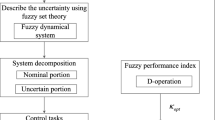Abstract
This paper proposes a data-driven modelling for a nonlinear discrete-time MIMO system in a robotic application, using a redundant robot for a trajectory tracking control of the end-effector. The Pseudo Jacobian Matrix computes an online equivalent model for the robotic system taking into account only two parameters tuning; the step parameter scales the estimation error and the weight parameter guarantees the estimation. The Lyapunov analysis based on a quadratic function in terms of the estimation error validates the setting parameters of the step parameter. A neuro-fuzzy network strcucture is used to adapt the step parameter considering the estimation error as input in oder to improve the identification of the Jacobian matrix during suddenly changes and uncertienties in the system. Besides, a novel control law is proposed for a trajectory tracking control based on a future function of the position error. The simulation results demonstrated the proposed data-driven model and control scheme for a redundant robot.
Access this chapter
Tax calculation will be finalised at checkout
Purchases are for personal use only
Similar content being viewed by others
References
Bolton, W.: Instrumentation and control systems. Newnes (2021)
Gómez, J., Treesatayapun, C., Morales, A.: Free model task space controller based on adaptive gain for robot manipulator using Jacobian estimation. In: Batyrshin, I., Martínez-Villaseñor, M.L., Ponce Espinosa, H.E. (eds.) MICAI 2018. LNCS (LNAI), vol. 11289, pp. 264–275. Springer, Cham (2018). https://doi.org/10.1007/978-3-030-04497-8_22
Gómez, J., Treesatayapun, C., Morales, A.: Multi-inputs and multi-outputs equivalent model based on data driven controller for a robotic system. IFAC-PapersOnLine 53(2), 9784–9789 (2020)
Gómez, J., Treesatayapun, C., Morales, A.: Data-driven identification and control based on optic tracking feedback for robotic systems. Int. J. Adv. Manuf. Technol. 113(5), 1485–1503 (2021)
Li, M., Kang, R., Branson, D.T., Dai, J.S.: Model-free control for continuum robots based on an adaptive Kalman filter. IEEE/ASME Trans. Mechatron. 23(1), 286–297 (2018)
Liu, H., Cheng, Q., Xiao, J., Hao, L.: Data-driven optimal tracking control for SMA actuated systems with prescribed performance via reinforcement learning. Mech. Syst. Signal Process. 177, 109191 (2022)
Liu, H., Cheng, Q., Xiao, J., Hao, L.: Performance-based data-driven optimal tracking control of shape memory alloy actuated manipulator through reinforcement learning. Eng. Appl. Artif. Intell. 114, 105060 (2022)
Treesatayapun, C.: Fuzzy rules emulated discrete-time controller based on plant’s input-output association. J. Control, Autom. Electr. Syst. 30(6), 902–910 (2019)
Treesatayapun, C., Uatrongjit, S.: Adaptive controller with fuzzy rules emulated structure and its applications. Eng. Appl. Artif. Intell. 18(5), 603–615 (2005)
Zen, Z., Cao, R., Hou, Z.: MIMO model free adaptive control of two degree of freedom manipulator. In: 2018 IEEE 7th Data Driven Control and Learning Systems Conference (DDCLS), pp. 693–697. IEEE (2018)
Acknowledgments
The authors thank to the Facultad de Ingeniería de la Universidad Autónoma de Coahuila.
Author information
Authors and Affiliations
Corresponding author
Editor information
Editors and Affiliations
Rights and permissions
Copyright information
© 2022 The Author(s), under exclusive license to Springer Nature Switzerland AG
About this paper
Cite this paper
Gómez, J., Morales, A., Treesatayapun, C., Muñiz, R. (2022). Data-driven-modelling and Control for a Class of Discrete-Time Robotic System Using an Adaptive Tuning for Pseudo Jacobian Matrix Algorithm. In: Pichardo Lagunas, O., Martínez-Miranda, J., Martínez Seis, B. (eds) Advances in Computational Intelligence. MICAI 2022. Lecture Notes in Computer Science(), vol 13613. Springer, Cham. https://doi.org/10.1007/978-3-031-19496-2_22
Download citation
DOI: https://doi.org/10.1007/978-3-031-19496-2_22
Published:
Publisher Name: Springer, Cham
Print ISBN: 978-3-031-19495-5
Online ISBN: 978-3-031-19496-2
eBook Packages: Computer ScienceComputer Science (R0)




